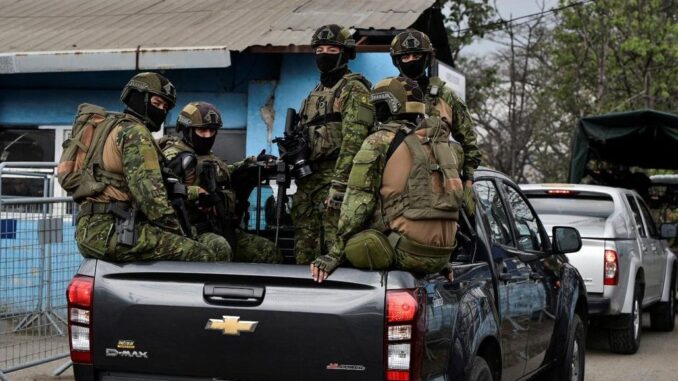
By ISL – Ecuador
Ecuador is currently experiencing an escalation of violence throughout the country as part of the state of emergency that was declared in the midst of the security crisis to which the country is exposed and where the escape of famous leaders of drug trafficking gangs exposes a particular network of hitmen, police, military, judicial forces and financial structures that keep the entire population in suspense.
While it is reported that, in different parts of the country, low-ranking police officers have been kidnapped, the prisons are uncontrolled, news about explosions, burned cars are spreading and this afternoon an important TV channel in Ecuador was occupied in the city of Guayaquil, then recovered almost without violence, curiously by the same police forces that were believed to have been overwhelmed.
Classes have been suspended, and the state of war decreed this afternoon prevents free movement and meetings after 11 PM until 5 AM.

“The term narcopolitics has been highlighted. We can see how criminal structures have permeated institutions to achieve their objectives,” said prosecutor Salazar, the same dark figure who directed an elaborate procedure called “metastasis,” which was announced with great journalistic display but which obtained few concrete results beyond the obvious: the complicity of all the powers of the state with the large drug cartels that exist in Ecuador.
The country is also particularly permeable to illegal financial structures that facilitate the laundering of all types of capital. It is not strange to think that the large Ecuadorian banks themselves (Guayaquil and Pichincha) are also part of the instigators of these confrontations according to their alignments with one or another cartel (Mexicans, Albanians, etc.).
This escalation of violence has transformed Ecuador into the country with the highest crime rate in Latin America, with the death of 46 people per 100,000 inhabitants, while recently, there have been governments that, as a result of their management, have thrown 10,000 Ecuadorians murdered, the foreign debt tripled and unemployment doubled in just over 5 years.
Of course, Noboa’s response and the entire institutional framework of capital (including that of former President Correa himself) is intended to be a “military” and “police” response, that is, the solution in the hands of the same institutions that are relentlessly corrupted by drug trafficking, trying to imitate the new idol of the Latin American right, the pro-imperialist dictator Bukele.
This climate of violence cannot be interpreted as a confrontation of “good guys” against “bad guys”, but rather a fight between cartels that express different sectors of the highly prostituted Ecuadorian bourgeoisie. While they fight for territories and profits, it is the working people who are forced to lock themselves in and suffer the implacable consequences of the “state of war.” Any call for national unity, like the one hypocritically declaimed by former President Correa, attempts to hide an incontrovertible reality: drug trafficking is part of power, it is encysted in the structures of the different governments; to believe that Noboa is capable of fighting them is to imagine him shooting himself. No solution can come from capitalist governments because each of them is a fundamental part of the problem.
Drug trafficking is not fought with more prisons, it is fought by dismantling the entire political/state/financial apparatus that protects and promotes it, it is fought by breaking ties with big businessmen who see this activity as a source of income and corrupt thousands of young people without any perspective. Of course, these answers will not come from the same old capitalist politicians who caused this disaster, but from the workers and the people themselves who must take all the responses to this criminal phenomenon into their own hands, choosing forms of self-defense and self-organization that, we believe, is necessary at each time and place. These tasks are what we propose to discuss in every place of work, of study, in every neighborhood because those of us at the bottom can only trust in our own strength, we cannot trust any of the “enlightened ones” who have led us to this tragedy.








